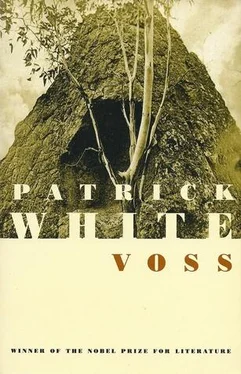‘I could push you over if I liked. I am stronger than you.’
So that her governess decided to remove her. In doing so, and in thanking Mrs de Courcy for the pleasure her charge had experienced, Miss Trevelyan omitted to take leave of Colonel Hebden.
‘Did you like my uncle?’ asked Mary, almost as soon as they were seated in the carriage.
‘Yes,’ said Miss Trevelyan. ‘He was extremely agreeable. And kind.’
Mary Hebden sighed, for all the men she knew, or it could have been that she was feeling sick from over-eating. Then the two passengers huddled against each other, in the stuffy atmosphere of oats and chaff that distinguished all vehicles from a livery stable.
‘And what are your plans?’ asked Mrs de Courcy of Colonel Hebden under the weeping elm.
‘I intend to return to Bathurst tomorrow,’ the Colonel volunteered.
‘I am happy to think Amelia and the children will benefit from your consideration,’ Mrs de Courcy said.
‘But shall leave shortly for Brisbane and Jildra. I realize that I did not fulfil my undertakings in those parts.’
‘You realized today. Thanks to Miss Trevelyan. I am jealous.’
‘You have no cause to be. I do not doubt that Miss Trevelyan is a young woman of considerable attainments. Quite beautiful, too. But beauty of an intellectual cast.’
‘Do not tell me!’ cried Mrs dc Courcy in mock rage.
In fact, all emotions must now be simulated, she knew from experience. If their relationship was to endure at all, it must do so on the frail thread of irony.
‘You devil,’ she added.
‘I have heard that word before,’ he laughed, opening his rather craggy face. ‘But, in this instance, its use is unjustified. Truly it is.’
It would have taken a far more serious accusation to quench the high spirits that the prospect of his journey had aroused. The attempts of the schoolmistress to discourage him had acted as a spur, and he had remained in a state of elation ever since. A man of less developed vanity might have inquired more deeply into Miss Trevelyan’s fears. But Colonel Hebden did not. In fact, he would give little further thought to one who could be of no more use to him.
FORCED to spend several months on his property at Bathurst in the company of his amiable wife, whose unselfishness tended to make her dull, and his children, who did not notice him at all, Colonel Hebden passed the time, somewhat irritably, in attending to his own affairs, and in dispatching letters to a number of acquaintances who shared his vice, the insatiable desire for perpetual motion through the unpleasanter portions of Australia. Finally, when all arrangements were made, the Colonel began to move north, gathering his party as he went. The company, however, was not fully assembled until they reached Jildra.
Brendan Boyle, who had been informed by Hebden of his intention to continue the search for Voss and who had responded with his usual rather flamboyant generosity, promising a mob of sheep, two native stockmen, and various articles of tackle that he personally would not have been without on such a journey, was waiting on the veranda, bursting out of his trousers, the shirt straining on his hairy navel, when the expedition arrived. The leader and the host had barely exchanged civilities, the members of the exploratory party had scarcely begun to ease their limbs, and the station blacks to enjoy an examination of the strangers’ goods, when Hebden asked anxiously:
‘Tell me, Boyle, did you have any luck?’
This referred to a passage in his letter of several months earlier, in which the Colonel had written:
With reference to the boy Jackie, it is most important that you detain him if he camps down with you before my arrival. If you should hear of his whereabouts even, from other natives, I would ask you to send word to him that his assistance is needed in locating the remains of Voss and his party, as well as those of the mutineers, or, if God should grant that any of these men be still alive, their unfortunate persons.
Now the Colonel could not wait to hear.
Boyle laughed. Out of respect for his stained whiskers, he formed his full lips into a delicate funnel, and spat.
‘Jackie,’ said the grazier, ‘did pass through Jildra a couple of weeks ago.’
‘And you did not apprehend him?’
The Colonel was quite taut.
‘Apprehend Jackie!’ said Boyle. ‘A man would as well attempt to put a willy-willy in a bag.’
‘Did you at least question him?’
‘Useless,’ sighed Boyle.
The Colonel would cheerfully have put under arrest this subordinate who had failed in his duties, but, in the circumstances, had to content himself with a show of blazing heartiness.
‘My dear fellow,’ he exclaimed, ‘do you know what you have done? You have only thrown the needle back into the haystack.’
Boyle waved a puffy hand.
‘Jackie,’ he said, ‘is mad.’
‘Madness will sometimes make sense,’ replied the Colonel piercingly.
‘I do not doubt you would have drawn the teeth out of the patient. Everybody always would have, except myself,’ said Boyle, who was still cheerful. ‘But come inside, Hebden, and let us sit down to a friendly drink. I can offer you some genuine Jamaica. None of this local stuff.’
So Jackie was not apprehended, just then.
*
What of Jackie?
On the most fateful day of his life, this boy, who had experienced too much too early, had run from the camp of his adoptive tribe. He ran a good deal at first, while the red light rose higher in the empty morning, but when the yellow sun took full possession of the sky the fugitive figure began to walk, though even then he was forced intermittently to run, as flashes of the grey soles of his feet would indicate.
The boy, whose isolation in the colourless landscape was not made less terrible by his black skin, carried with him his empty hands. He wore a girdle of bark cloth, and round his neck, upon a string that he had begged one evening from Mr Judd, the bone-handled pocket-knife, a present from their leader. So that, as well as being alone, he was almost quite naked. In normal circumstances, the isolation would gradually have been reduced by the many little measures that made life agreeable and possible: by following the tracks of animals, by looking into scrub or logs, by looking for water or honey, by looking, always by looking. Temporarily, however, his eyes would not see clearly, and the loneliness was increased by his thoughts. Terrible knives of thought, sharpened upon the knives of the sun, were cutting into him. At night his thoughts, less defined, became, or were interchangeable with those spirits that haunted the places where he chose to sleep.
So Jackie continued on his way. Whether he made fire or not, he was not saved from darkness. When it was necessary he did dig for yams, or stone a lizard, or suck the liquid roots of certain trees, or even the leaves of trees while the dew was still upon them, because to quench thirst and satisfy hunger were habits that he had learnt. Once he stalked some emu chicks, and eventually clutched a straggler and was feeling for his little knife, but suddenly preferred to wring the bird’s neck.
How, finally, he came to lose the knife he could not tell, but threw off the broken, greasy string, glad for what was a disaster of some practical significance.
The absence of the knife’s physical weight did not relieve his spirit, however. Because he was without obligations and there was nobody to observe, he would certainly play at times as if he had been still a child, but these short-lived games did not really interest him, for duties were allocated to children at a very early age.
At least he knew the comfort of motion. He was always travelling. Once at dusk, in an outcrop of rock, he came upon the hip-bone of a horse still wearing its grey hide and, next to it, a snaffle ring that rust was eating. The boy could not help but recall the immaculate, the superhuman perfection that the splendour of all such harness could suggest. In his mind it glittered, as in the country of its origin. He touched the ring, but became more cautious, even afraid, as he approached the fusty clothes that contained the few remains of a man. Then, he kicked the bundle, and rummaged in it. It was, he saw, the last of the one they called Turner, whom he had avoided whenever possible on account of his smell, which was the particular smell of all dirty white men.
Читать дальше












